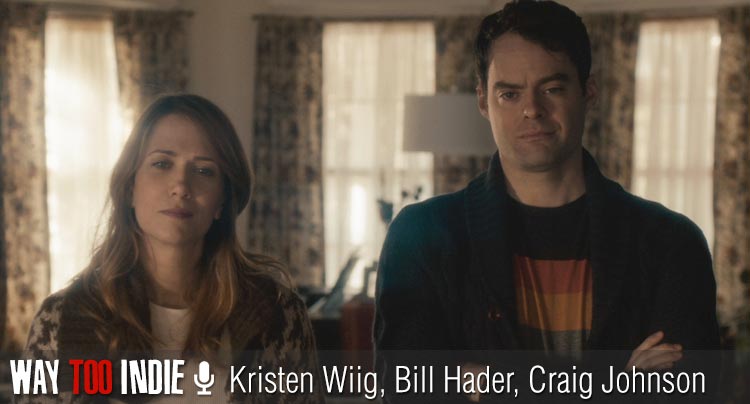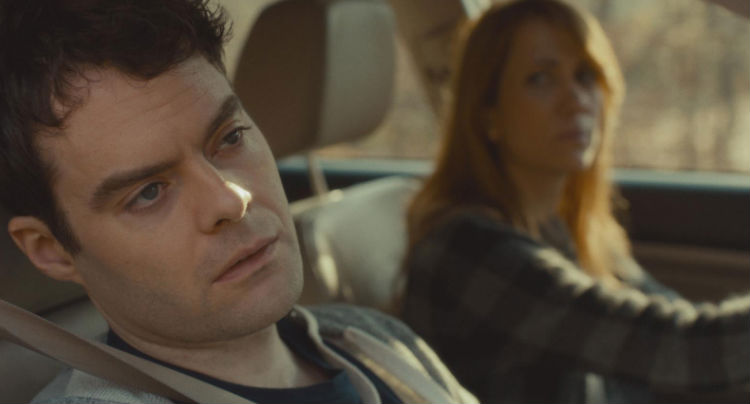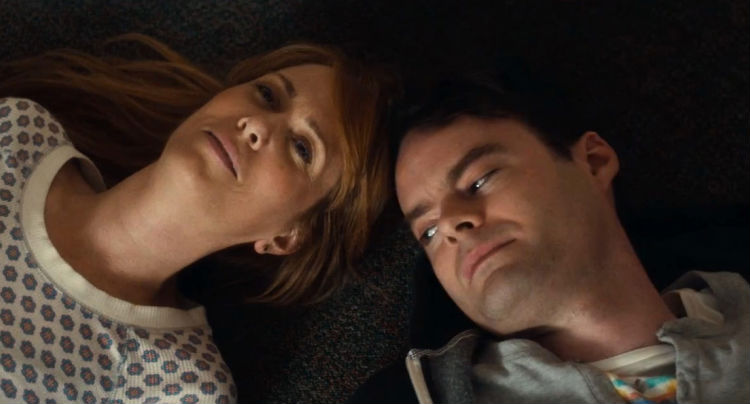Kristen Wiig and Bill Hader Test the Dramatic Waters and Sing Starship in Craig Johnson’s ‘The Skeleton Twins’

Taking the electric chemistry they had on Saturday Night Live and exercising it in a more dramatic arena, Kristen Wiig and Bill Hader reunite in The Skeleton Twins, in which they play estranged twins brought together by tragedy who are forced to reckon with their dark past, where it’s led them, and try to keep each other laughing before they mope themselves to death. The film, directed by Craig Johnson, also stars Luke Wilson and Ty Burrell.
In a roundtable interview with other journalists, we spoke to Wiig, Hader, and Johnson about the script taking eight years to complete, Hader tackling his first dramatic role, the importance of the film’s unique tone, Wiig and Hader’s “Starship” duet, and more. The Skeleton Twins hits select theaters this Friday, with a wider release to follow.

You’ve been working on the script with Mark Heyman for around eight years. How did the final film differentiate from the initial script?
Craig: We had a couple versions of it where we hadn’t figured out the tone yet. There were versions where Milo was a drag queen and some were over-the-top. There was a road trip element…
Kristen: Maggie was a cat…
Bill: But they were still twins! [laughs]
Craig: They’re joking, but it was not too far off. [laughs] Mark and I just said, “What kind of movie do we want to make?” We wanted to do something that was tonally down-to-earth, bittersweet, funny, sad, reflective…We’re fans of Alexander Payne’s movies. We went back into it, and that draft was much more similar to how the final movie ended up. The eight years in between wasn’t consistent. There were two-and-a-half years where the script sat in a drawer.
Kristen: Then you heard [in a nasal-y voice], “Ooooh let me out! Remember me!” from the drawer.
Bill: “You submitted me to the WGA in 2003! My tummy hurts…”
Craig: [laughs] Does that answer your question?
Bill and Kristen, you’ve established a strong comedic chemistry over many years at SNL. Doing these more emotionally intense scenes, does the dynamic feel different?
Kristen: No, it doesn’t.
Bill: Yeah, not really. We’ve worked with each other for so long. Acting is acting, and I feel very lucky and privileged to come up with Kristen and do Saturday Night Live. You fail together and you learn from each other. Any time Kristen would do something we would go out on the floor to watch it because she’s such a good live performer. You learn from her. When you do something like this, it’s a different style of acting, but it’s the same thing of, you’re thinking about your character, you have ideas, you show up having done your homework…
Kristen: The outcome is different, but you still want to get to the best place. [At] SNL, yes we would be in crazy wigs and characters and stuff, but we knew the job was to make the characters funny and make it work. This [film] was like, who are these two people? We have to make them believable and real.
Bill: You’re going over your material…It’s like homework for me. You go over it so that you’re confident when you show up on the day.
Was it hard for you to keep everything in check tonally? The subject matter can be pretty touchy at times.
Bill: We were all over the place. The tone of the movie is really hard to achieve. Craig and the editor, Jenny, did an amazing job, because they’re very disciplined. There was a lot of stuff that we did that was really, really funny, and some things that were incredibly bleak and more hard to watch. Craig was disciplined enough to say, “This is what’s right for the movie.”
Craig: Getting the tone right to a movie like this was critical. It was everything. We knew that that was marching order number 1. There are so many things that factor into that: How comedic do we go? How dark do we go? Music is huge for that. Music is really important to me, so finding the right music for the score and source music was critical. It’s intuitive. It’s hard to say when you know you’ve got it, but there’s this feeling of, “This is starting to feel right.” We’d screen rough cuts of it to get feedback. It has so much to do with gut-checking yourself and being honest. “Am I leaving this in because it makes me laugh, when it doesn’t feel like what the characters would do?”
Kristen: It’s so interesting that people say that it’s a different tone and doesn’t fall into total comedy or total drama. It’s funny, because that’s what life is. We watch these stories of these people’s lives, and it’s not all just one thing.
Craig: Movies are ruled by genres so often, and things go binary and go black & white pretty quickly. Many movies don’t; there’s a whole tradition of wonderful movies that are similar in tone to this one. I just watched The Ice Storm by Ang Lee, and that’s in a similar world.
Bill: [In old news reporter voice] “Craig Johnson compares himself to Ang Lee! What do you think?”
Kristen: “He implies he’s even better!”
Bill: “Ang Lee angry! Craig Johnson’s body found eaten by a tiger! Probably Ang Lee!”
When you two do the sing-along to Starship’s “Nothing’s Gonna Stop Us Now”, I was surprised you ended up doing the whole song. It was stuck in my head for five days.
Craig: You’re welcome!
Bill: It’s still in our heads…
Craig: [To Bill] When you first saw that cut, I remember you saying, “You really go punk rock on that Starship scene!”
Bill: Yeah, ’cause you keep going!
Craig: It was never written in my head to actually be that song, but when we found it and it was a duet with Milo trying to get Maggie to sing, it just naturally turned into a little more of a showpiece.
Having just gone through a debate of, “Which is more craptastic, Starship or Steve Miller Band?”, how did you arrive at that particular song?
Craig: “We Built This City” is often on the top of lists of worst songs of all time, but it’s of an era.
Kristen: We all know it.
Bill: Whether you like it or not, that’s what they’re saying! They’re sitting on a big pile of money like, “Craptastic paid for all of this!”
Craig: I knew that I wanted a song from the ’80s, a song that they probably grooved on as little kids, and they probably did that routine as little kids. I listened to a ton of different ’80s hook-y ballads and lip-synced them to see what worked. That duet just worked. It had the right amount of uplift and back-and-forth.
Bill, being that this is your first dramatic role, what made Milo stand out?
Bill: I’d always wanted to do something like this. Avy Kaufman, the casting director, saw me do a table read for a drama and she thought it was really good and recommended me to Craig. I read the script, and it was the first script I’d ever received that was like this. Every script before it was very much in tone like either SNL stuff or Judd Apatow stuff, which isn’t bad, but I like a lot of different types of movies. It was cool. Craig had a lot of faith in me, and it was great when Kristen got brought on. I was a little anxious doing this, so having Kristen there…She’s such an amazing actor, and there’s a security to that. Working together feels very effortless. That’s what I needed to do my job.

Your scenes with Ty Burrell are really heavy and intense. What was your chemistry like with him?
Bill: The first three days of shooting was with Ty. It was great because he totally set the tone for the movie. I was a huge fan of his. He was so nice. Having him there going, “This is really cool what you’re doing,” meant the world to me. Those scenes were some of the toughest scenes subject-wise. Everything about those scenes was pretty tough.
Craig: It was the first three days, so we were all finding our footing. At the end of those three days I was breathing a sigh of relief, because everything felt right. The tone felt right, Ty and Bill had chemistry…
Bill: The last scene we shot was the scene where Ty’s talking to me on the couch, and he improvised the line…
Craig: When Bill says, “What am I to you? Am I just a blowup doll?”, Ty says, “I treated you terribly, but it’s not because I don’t care about you, or don’t respect you, or don’t love you.” The “don’t love you” wasn’t in the script. I could see the heartbeat of the movie at that point. I like working with actors that are willing to improvise. I’m very specific when I write the script, but I always like it when there is a bit of wiggle room.
Bill: He felt something, and in the moment he just said it. He did that, and it sparked a reaction in me.
What are your favorite comedian-turned-dramatic-actors?
Craig: I like what Adam Sandler does in Punch Drunk Love.
Kristen: Peter Sellers is up there.
Bill: I don’t really think in those terms. I think it puts you in a box, in a way. I like people who swerve. I always like Jeff Bridges, because you never knew what you were going to get from him.
I think it’s inspiring for audiences to see actors branch out.
Bill: That is true. That’s 100% true. I guess I always lose sight of that because you sit at home going, “I can do all these things! I can do anything!” But those are the actors I like. Lately, I’ve liked what Bryan Cranston did in Breaking Bad and knowing him from Malcolm in the Middle.
We were just talking about Bill’s relationship with Ty, but now Kristen I want to talk to you about your relationship with Luke Wilson. At the beginning of the movie I thought we would end up disliking Lance, but that never happened.
Kristen: Just because something’s good on paper doesn’t mean it’s right for you, and I think that’s one of the reasons why she and people stay with people who may not be the best thing for them. It’s hard to talk yourself out of it. “What’s my problem?” I think she thought something was wrong with her because she wasn’t fulfilled by this seemingly great person. I think that added to her depression a bit. When you wake up every day and ask, “What’s wrong with me?”, it’ get’s a little tiring. She and hopefully the audience realize that sometimes it’s not a fit, and that’s okay. When you release someone you’re actually doing them a favor, because he needs to be with someone who thinks he’s really great and loves his weird shoes.
Craig: It was really important for us when we were writing that relationship that, because Lance is an innocent in it, we saw her racked with guilt and pain about her behavior. It’s killing her. That put it more on a balanced level.
Kristen: It’s hard not to immediately take sides. “He’s so great! What’s her problem?” I think you do feel that way at times in the movie.
Craig: We tried to make it harder to judge each character, which I think is what life is like.
This is one of the best movies I’ve seen that shows how family dysfunction is a generational thing. You see the mother, and there are hints about what the father is about. Did you have a backstory for what the dynamic was within the family?
Craig: I certainly do.
Bill: When we finally got Kristen on and we had a start date, Craig and I walked around my neighborhood, and he just told me the whole backstory. It was helpful.
Craig: I kind of want to leave it up to the audience. I think if you go back to it and start thinking about timelines and when the mother left in relation to when the father died, you can start piecing together dynamics.
Bill: Okay, now I’m backtracking on by big, righteous thing. John Candy in Planes, Trains, & Automobiles. He breaks my heart in that movie, and he’s really funny.
